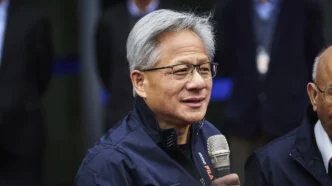Nvidia has revealed a massive financial blow from U.S. export restrictions as it reported earnings for the first quarter of fiscal year 2026. The AI chipmaker confirmed it took a $4.5 billion charge tied to licensing constraints that have crippled its ability to sell the H20 chip — a key component of its AI product line — to customers in China.
Export Ban Hits Nvidia’s China Ambitions
The numbers show the scale of impact: Nvidia was unable to ship an additional $2.5 billion worth of H20 chips in Q1, further compounding its losses. In total, the export rules blocked $7 billion in potential Q1 revenue. The company had previously warned investors to expect $5.5 billion in related charges, but actual losses exceeded that estimate.
The bigger concern, however, is what’s coming next. Nvidia now anticipates an $8 billion revenue hit in Q2 alone due to ongoing licensing issues. For a company expecting around $45 billion in revenue next quarter, that’s nearly 18% gone — all tied to its now-crippled business in China.
During the Q1 earnings call, Nvidia CEO Jensen Huang didn’t mince words. He described China as “effectively closed” to the company’s Hopper-based data center business. “The H20 export ban ended our Hopper data center business in China. We cannot reduce Hopper further to comply,” Huang said.
China has long been a cornerstone of Nvidia’s AI expansion strategy. Huang emphasized that half of the world’s AI researchers are based in China and that it remains one of the largest AI markets globally — worth an estimated $50 billion.
Blocking Nvidia in China Helps Its Competitors
Huang criticized the Trump administration’s export restrictions, saying they don’t just harm Nvidia — they also embolden Chinese chipmakers to catch up. “The question is not whether China will have AI; it already does,” he said. “The question is whether one of the world’s largest AI markets will run on American platforms.”
He welcomed the Biden administration’s decision to scrap the proposed AI Diffusion Rule, which would have introduced even more restrictions on AI chip exports. Still, Nvidia’s position remains precarious, especially as the current export environment makes it harder for the company to compete in China.
While Nvidia is exploring alternative strategies to maintain a presence in China’s AI ecosystem, it’s clear the current geopolitical landscape is shifting — and fast. The company may be dominating the global AI chip race today, but its ability to maintain that lead without access to one of the world’s biggest markets is now in serious question.













